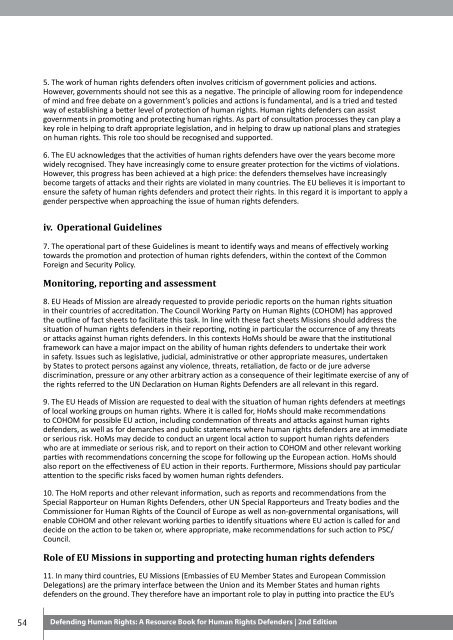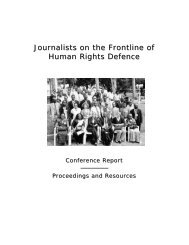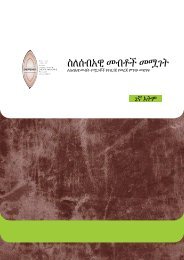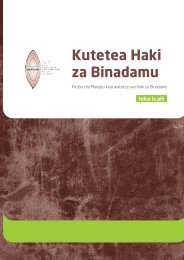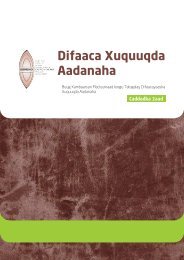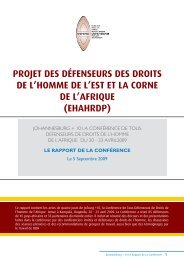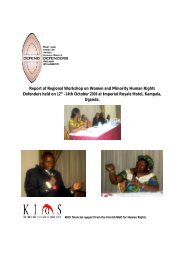Defending Human Rights: A Resource Book for Human
Defending Human Rights: A Resource Book for Human
Defending Human Rights: A Resource Book for Human
You also want an ePaper? Increase the reach of your titles
YUMPU automatically turns print PDFs into web optimized ePapers that Google loves.
5. The work of human rights defenders often involves criticism of government policies and actions.<br />
However, governments should not see this as a negative. The principle of allowing room <strong>for</strong> independence<br />
of mind and free debate on a government’s policies and actions is fundamental, and is a tried and tested<br />
way of establishing a better level of protection of human rights. <strong>Human</strong> rights defenders can assist<br />
governments in promoting and protecting human rights. As part of consultation processes they can play a<br />
key role in helping to draft appropriate legislation, and in helping to draw up national plans and strategies<br />
on human rights. This role too should be recognised and supported.<br />
6. The EU acknowledges that the activities of human rights defenders have over the years become more<br />
widely recognised. They have increasingly come to ensure greater protection <strong>for</strong> the victims of violations.<br />
However, this progress has been achieved at a high price: the defenders themselves have increasingly<br />
become targets of attacks and their rights are violated in many countries. The EU believes it is important to<br />
ensure the safety of human rights defenders and protect their rights. In this regard it is important to apply a<br />
gender perspective when approaching the issue of human rights defenders.<br />
iv. Operational Guidelines<br />
7. The operational part of these Guidelines is meant to identify ways and means of effectively working<br />
towards the promotion and protection of human rights defenders, within the context of the Common<br />
Foreign and Security Policy.<br />
Monitoring, reporting and assessment<br />
8. EU Heads of Mission are already requested to provide periodic reports on the human rights situation<br />
in their countries of accreditation. The Council Working Party on <strong>Human</strong> <strong>Rights</strong> (COHOM) has approved<br />
the outline of fact sheets to facilitate this task. In line with these fact sheets Missions should address the<br />
situation of human rights defenders in their reporting, noting in particular the occurrence of any threats<br />
or attacks against human rights defenders. In this contexts HoMs should be aware that the institutional<br />
framework can have a major impact on the ability of human rights defenders to undertake their work<br />
in safety. Issues such as legislative, judicial, administrative or other appropriate measures, undertaken<br />
by States to protect persons against any violence, threats, retaliation, de facto or de jure adverse<br />
discrimination, pressure or any other arbitrary action as a consequence of their legitimate exercise of any of<br />
the rights referred to the UN Declaration on <strong>Human</strong> <strong>Rights</strong> Defenders are all relevant in this regard.<br />
9. The EU Heads of Mission are requested to deal with the situation of human rights defenders at meetings<br />
of local working groups on human rights. Where it is called <strong>for</strong>, HoMs should make recommendations<br />
to COHOM <strong>for</strong> possible EU action, including condemnation of threats and attacks against human rights<br />
defenders, as well as <strong>for</strong> demarches and public statements where human rights defenders are at immediate<br />
or serious risk. HoMs may decide to conduct an urgent local action to support human rights defenders<br />
who are at immediate or serious risk, and to report on their action to COHOM and other relevant working<br />
parties with recommendations concerning the scope <strong>for</strong> following up the European action. HoMs should<br />
also report on the effectiveness of EU action in their reports. Furthermore, Missions should pay particular<br />
attention to the specific risks faced by women human rights defenders.<br />
10. The HoM reports and other relevant in<strong>for</strong>mation, such as reports and recommendations from the<br />
Special Rapporteur on <strong>Human</strong> <strong>Rights</strong> Defenders, other UN Special Rapporteurs and Treaty bodies and the<br />
Commissioner <strong>for</strong> <strong>Human</strong> <strong>Rights</strong> of the Council of Europe as well as non-governmental organisations, will<br />
enable COHOM and other relevant working parties to identify situations where EU action is called <strong>for</strong> and<br />
decide on the action to be taken or, where appropriate, make recommendations <strong>for</strong> such action to PSC/<br />
Council.<br />
Role of EU Missions in supporting and protecting human rights defenders<br />
11. In many third countries, EU Missions (Embassies of EU Member States and European Commission<br />
Delegations) are the primary interface between the Union and its Member States and human rights<br />
defenders on the ground. They there<strong>for</strong>e have an important role to play in putting into practice the EU’s<br />
54<br />
<strong>Defending</strong> <strong>Human</strong> <strong>Rights</strong>: A <strong>Resource</strong> <strong>Book</strong> <strong>for</strong> <strong>Human</strong> <strong>Rights</strong> Defenders | 2nd Edition


